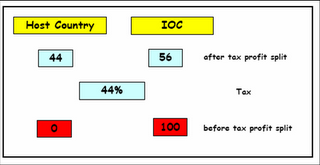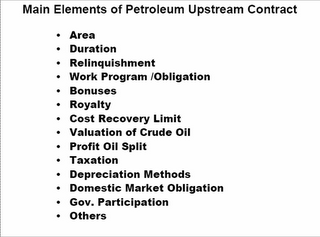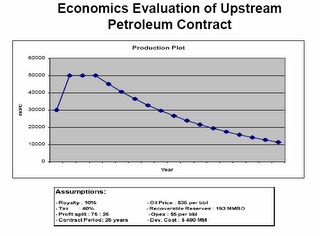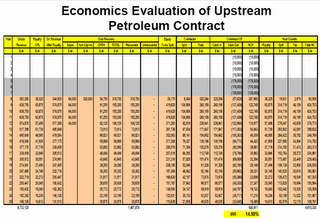Sekarang coba kita baca dan komentari - yang saya copy-paste dari website SPE (pake italic font):
PSC Reserves:
Production-Sharing Contracts (PSCs) of various types replace conventional royalty-based systems in many countries. Under the PSC terms, the producers have an entitlement to a portion of the production. This entitlement, often referred to as “net entitlement” or “net economic interest,” is estimated using a formula (based on contract terms) incorporating project costs (cost oil) and project profits (profit oil). Although ownership of the production invariably remains with the government authority, the producers may claim their share of the net entitlement as Reserves.
Jadi dapat kita lihat disini, dalam sistem PSC, ada juga yang namanya transfer of ownership, yang penting itu dimana terjadinya transfer of ownership itu (umumnya sich untuk PSC transfer of ownership terjadi di point of export – bedanya dengan sistem royalty tax dimana transfer of ownership terjadi di wellhead).
Risked-Service Contracts (RSCs) are similar to PSCs, but in this case, the producers are paid in cash rather than in production. As with PSCs, the Reserves claimed are based on the parties’ share of the net entitlement or net economic interest. Care needs to be taken to distinguish between an RSC and a “Pure Service Contract.”
Reserves can be claimed in an RSC on the basis that the producers are exposed to market risk, whereas no Reserves can be claimed for Pure Service Contracts because there are no market risks and the producers act as contractors.
Jadi bedanya PSC dengan RSC cuma pembayarannya doang, RSC pake cash PSC pake production. RSC bisa juga klaim reserves. Ini masalahnya, service contract itu umumnya emang “pure” service contract bukan RSC - jadi nggak boleh booking reserves, kalau service contract bisa booking reserves, maka dia masuk golongan RSC (tapi RSC ini relatif jarang – banyakan yang pure).
".. the cost recovery system in production-sharing, risk service, and other related contracts typically reduce the production share, and, hence, Reserves obtained by a contactor in periods of high price and increase volumes in periods of low price”
Cukup jelas nggak maksudnya?, jadi gini: cost yang dikeluarkan itu berupa uang (dolar), sementara produksi itu khan dalam volume (barrel), jadi pada saat mau bayar cost recovery, harus di konversi dulu cost tadi kedalam volume (barrel), caranya ? bagi aja dengan harga minyaknya – jadi kalau pas harga minyak tinggi, cost recovery (dalam barrel) lebih kecil, sebaliknya kalau harga minyak rendah, cost recovery dalam barel jadi naik. Cost recovery ini khan masuk bagian dari entitlement kontraktor – ya reserves kalau di report-nya contractor.
Sekarang kita lihat sub bab mengenai contract extensions:
As production-sharing or other types of agreements approach maturity, they can be extended by negotiation for contract extensions, by the exercise of options to extend, or by other means. Reserves should not be claimed for those volumes that will be produced beyond the end date of the current agreement unless there is reasonable certainty that an extension will be granted.
Such reasonable certainty may be based on the historical treatment of similar agreements by the license-issuing jurisdiction. Where doubt exists regarding a renewal being granted, forecast production beyond the contact term should be categorized as Contingent Resources with an associated reduced chance of commercialization. Moreover, it may not be reasonable to assume that the fiscal terms in a negotiated extension will be similar to existing terms.
Jadi kontraktor nggak boleh klaim reserves melewati masa kontraknya, kecuali kontraknya udah diperpanjang (resmi) sama government. Yang menarik, kalau masih nggak jelas diperpanjang atau nggak – “remaining reserves” itu masuk kategori “contingent resources”. Lihat kalimat terakhir: umumnya fiscal terms berubah pada saat extention – in favour of host country, kalau sama aja? Itu artinya gov. negotiatornya kurang canggih…
Masih banyak lagi yang di cover sama draft guideline ini, silahkan baca sendiri – dan kalau bisa kasih masukkan, siapa tahu Anda pernah ada case tertentu – justru yang diharapkan tuh masukkan praktisi, yang sehari harinya bergelut dengan hal hal terkait reserves/resources, kontrak dan ujung2 komersial – Guideline SPE (dan WPC, AAPG, SPEE) seperti biasa (nantinya) jadi semacam “pegangan” pelaku migas – very credible!.















